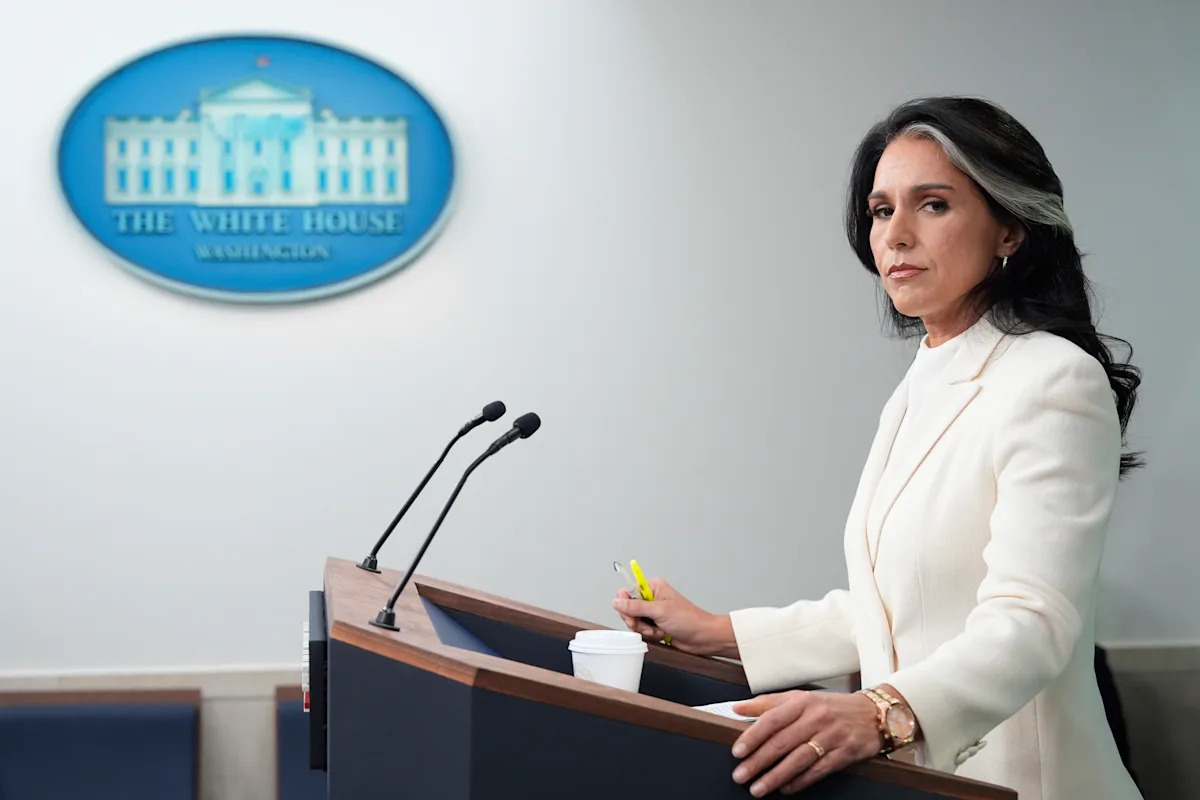Director of National Intelligence Tulsi Gabbard on Wednesday declassified documents she claims prove intelligence officials in the Obama administration lied about Russia’s efforts to influence the 2016 election.
The 44-page review of how U.S. spy agencies under then-President Barack Obama arrived at their conclusions was led by Republicans on the House Intelligence Committee and ordered in the aftermath of Donald Trump’s win over Hillary Clinton in 2016.
The move comes days after Gabbard released a separate tranche of documents on the 2016 election that she claimed showed evidence that senior intelligence officials under Obama had mounted a “years-long coup” to undermine Trump and were guilty of a “treasonous conspiracy.”
She amped up her rhetoric again on Wednesday.
The documents contain “irrefutable evidence that details how President Obama and his national security team directed the creation of an intelligence community assessment that they knew was false,” Gabbard said in a surprise appearance at a White House press conference Wednesday afternoon.
Congressional Democrats cast the release of the documents as a reckless bid to appease Trump and claimed the GOP-led congressional review itself was deeply flawed.
“Releasing this so-called report is just another reckless act by a Director of National Intelligence so desperate to please Donald Trump that she is willing to risk classified sources, betray our allies, and politicize the very intelligence she has been entrusted to protect,” Senate Intelligence Vice Chair Mark Warner (D-Va.) said in a press release.
Like a more recent review of the 2016 election put out this month by CIA Director John Ratcliffe, the House Intelligence report offered significant criticism of the intelligence community — though it was much more measured than the way Gabbard, Ratcliffe and other Republicans characterized the newly released documents publicly.
On the ODNI’s website, the report was described as a “Declassified HPSCI Report on the Manufactured Russia Hoax.” But the GOP-led review did not question the intelligence community’s assessment that Russian President Vladimir Putin ordered a series of influence operations and hack-and-leak efforts against Clinton.
It also took no issue with the determination that Putin sought to undermine both American democracy generally and Clinton, who the Russian leader assumed would be the country’s next president.
“Most ICA judgments on Russian activities in the U.S. election employed proper tradecraft and were consistent with observed Russian behavior,” the review stated.
It found fault mainly with how the intelligence community arrived at its third high-confidence assessment about that year’s election: that Putin and others in the Russian government wanted to see Trump in the White House.
Obama-era intelligence officials based their conclusion largely on a “scant, unclear and unverifiable fragment” from a single spy source, the report said. It also argued that the agency did not adhere to spy community standards in sufficiently considering alternative explanations for Putin’s actions or informing policymakers of intelligence that called his alleged preference for Trump into question.
For example, the report said Russian intelligence services had explosive information on Clinton that they never leaked to the press. That included information allegedly indicating Clinton had significant health issues, the report said.
The report heaps significant criticism on then-CIA Director John Brennan. It finds Brennan pushed for inclusion of the assessment on Putin’s preference for Trump in the aftermath of the 2016 vote and against the recommendation of some analysts beneath him.
Brennan could not be reached for comment. But a spokesperson for Obama offered a rare public rebuke of the allegations after Trump accused the former president and other former senior officials of treason on Tuesday night.
The House panel’s report in some places echoed the CIA’s recent review. Both raise questions about how few intelligence officials were involved in conducting the assessment, and whether Obama administration officials were transparent about the extent to which they relied on the now-debunked Steele dossier, for example.
In their statements Wednesday, Warner and Rep. Jim Himes (D-Conn.) both pointed out that a multivolume review produced by the Senate Intelligence Committee did not find the same issues as the 44-page House review.
The Senate spy panel was headed during the writing of its 2020 review first by Republican Sen. Richard Burr of North Carolina, who introduced Gabbard at her confirmation hearing, and later by Secretary of State Marco Rubio.
The final recommendations from the HPSCI review suggested that intelligence officials improve the peer review process for controversial intelligence assessments and for political appointees to recuse themselves when those occur during presidential transitions, among others.
The declassifications have nonetheless delighted Trump. On Tuesday, he called Gabbard, who recently looked to be sidelined in his administration, “the hottest one in the room right now.”

